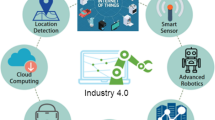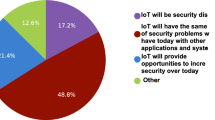Abstract
RFID introduction is a hotly debated public policy issue. The technology enables physical environments to become more interactive and supportive by tagging each item with a chip that wirelessly communicates with a service-enriched backend infrastructure. Based on a number of user studies at Humboldt-Universität and at the Auto-ID Center, this article presents the major fears associated with RFID introduction. We show to what extent these fears are justified and derive a number of system requirements for giving users more control over an RFID-enabled IT infrastructure. After presenting several recent technical proposals for privacy protection, we focus on the question of controlled access to RFID tags. We conclude with a proposal for an easy-to-use private password model.
Similar content being viewed by others
Literatur
Auto-ID Center: EPC-256: The 256-bit Electronic Product Code Representation. http://archive.epcglobalinc.org/aboutthetech_research.asp, Massachusetts Institute of Technology (MIT), Cambridge, USA 2003.
Auto-ID Center: The Use of the Electronic Product Code. http://archive.epcglobalinc.org/aboutthetech_research.asp, Massachusetts Institute of Technology (MIT), Cambridge, USA 2003.
Beckwith, R: Designing for Ubiquity: The Perception of Privacy. In: IEEE Pervasive 2 (2003) 2, S. 40–46.
Bohn, Jürgen; Coroama, Vlad; Langheinrich, Marc; Mattern, Friedemann; Rohs, Michael: Living in a World of Smart Everyday Objects — Social, Economic, and Ethical Implications. In: Journal of Human and Ecological Risk Assessment 10 (2004) 5.
Churchill, Gilbert; Iacobucci, Dawn: Marketing Research: Methodological Foundations. South-Western College Pub., 2001.
Cranor, Lorrie Faith: P3P: Making Privacy Policies More Useful. 2003. S. 50–55.
Cranor, Lorrie Faith; Reidenberg, Joel: Can user agents accurately represent privacy notices? The 30th Research Conference on Information, Communication, and Internet Policy. Alexandria, Virginia, USA, 2002.
Duce, Helen: Public Policy: Understanding Public Opinion. University of Cambridge, Cambridge, UK, 2003.
Engels, Daniel; Rivest, Ronald; Sarma, Sanjay; Weis, Stephen: Security and Privacy Aspects of Low-Cost Radio Frequency Identification Systems. First International Conference on Security in Pervasive Computing, SPC 2003. Springer Verlag, Boppard, USA, 2003.
EPC-Global: 900 MHz Class 0 Radio Frequency (RF) Identification Tag Specification. http://www.epcglobalinc.org/standards_technology/Secure/v1.0/UHF-class0.pdf, 2003.
Floerkemeier, Christian; Schneider, Roland; Langheinrich, Marc: Scanning with a Purpose — Supporting the Fair Information Principles in RFID Protocols. 2nd International Symposium on Ubiquitous Computing Systems. Tokyo, Japan, 2004.
FoeBuD e.V.: Positionspapier über den Gebrauch von RFID auf und in Konsumgütern. FoeBuD e.V., Bielefeld 2003, S. 14.
FoeBuD e.V.: Studie über Schutz der Privatsphäre vor RFID online. http://stoprfid.de/aktuell/aktuell18.html, 2004–11–06.
GCI, Global Commerce Initiative: Global Commerce Initiative EPC Roadmap. 2003.
Inoue, Yasuura: RFID Privacy Using User-controllable Uniqueness. RFID Privacy Workshop 2004. http://www.rfidprivacy.org, Massachusetts Institute of Technology (MIT), Cambridge, USA, 2004.
Hennig, Jan; Ladkin, Peter; Sieker, Bernd: Privacy-Enhancing Concepts for RFID Technology Scrutinised. RVS Group, Universität Bielefeld, Bielefeld 2004.
Juels, Ari; Rivest, Ronald; Szydlo, Michael: The Blocker Tag: Selective Blocking of RFID Tags for Consumer Privacy. 10th Annual ACM CCS 2003. http://theory.lcs.mit.edu/~rivest/, 2003.
Langheinrich, Marc: A Privacy Awareness System for Ubiquitous Computing Environments. 4th International Conference on Ubiquitous Computing, UbiComp2002. Springer- Verlag, Göteborg, Sweden, 2003.
Langheinrich, Marc: Die Privatsphäre im Ubiquitous Computing — Datenschutzaspekte der RFID-Technologie. http://www.vs.inf.ethz.ch/publ/papers/langhein2004rfid.pdf, ETH Zürich, Zürich 2004.
Lederer, Scott; Dey, A.: A Conceptual Model and a Metaphor of Everyday Privacy in Ubiquitous Computing Environments. UC Berkeley, Berkeley, USA, 2002.
Philips: Data Sheet zu Philips I-Code SL2 ICS11. http://www.semiconductors.philips.com/acrobat/other/identification/SL092030.pdf, 2003.
Pohl, Hartmut: Hintergrundinformationen der Gesellschaft für Informatik e.V. (GI) zu RFID — Radio Frequency Identification. 2004.
Spiekermann, Sarah; Berthold, Oliver: Maintaining privacy in RFID enabled environments — Proposal for a disable-model. In: Robinson, Philip; Vogt, Harald; Wagealla, Waleed (Eds.): Privacy, Security and Trust within the Context of Pervasive Computing. Springer Verlag, Vienna, Austria, 2004.
Spiekermann, Sarah; Grossklags, Jens; Berendt, Bettina: E-privacy in 2nd generation ECommerce. Proceedings of the 3rd ACM Conference on Electronic Commerce EC’01. ACM Press., Tampa, Florida, USA, 2001.
Spiekermann, Sarah; Guenther, Oliver: RFID & Privacy: Consumer Perspective & Technology Insights. http://www.m-lab.ch/rfidws.html, St.Gallen, CH, 2004.
Spiekermann, Sarah; Ziekow, Holger: Technische Analyse RFID-bezogener Angstszenarien. http://www.wiwi.hu-berlin.de/~sspiek/phdresearch.htm, Institut für Wirtschaftsinformatik — Humboldt Universität zu Berlin, Berlin 2004, S. 44.
Weiser, Mark: The Computer for the 21st Century. 1991, S. 94–104.
Wolfram, Gerd: RFID-Fahrplan der Metro Group im Detail. Präsentation gehalten auf dem RFID-Kongress für die Partner der METRO Group Köln, 2004–05–14.
Author information
Authors and Affiliations
Rights and permissions
About this article
Cite this article
Berthold, O., Günther, O. & Spiekermann, S. RFID: Verbraucherängste und verbraucherschutz. Wirtschaftsinf 47, 422–430 (2005). https://doi.org/10.1007/BF03252655
Issue Date:
DOI: https://doi.org/10.1007/BF03252655




